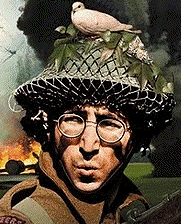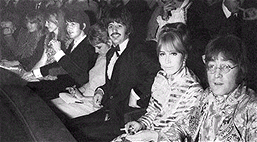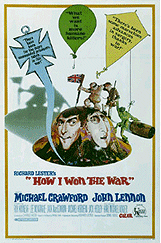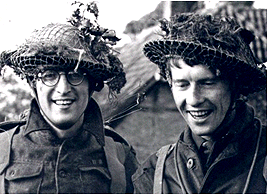Sixties
City presents
a wide-ranging series of
articles on all aspects of the Sixties, penned by the creator of the iconic
60s music paper Mersey
Beat
|
Sixties
City presents
a wide-ranging series of
articles on all aspects of the Sixties, penned by the creator of the iconic
60s music paper Mersey
Beat
|
|||||
|
 |
John
Lennon's first real solo venture - a film in which he made his first appearance,
minus his fellow Beatles, in the role of Private Gripweed of the Third
Troop of the Fourth Musketeers. The part was specially written for John
and filming took place between 5th September and 7th November 1966. The
film was an anti-war movie set in the Western desert, Dunkirk, Dieppe,
El Alamein and Arnhem, with newsreel shots linking the various parts of
the film. The movie was based on the novel by Patrick Ryan and the screenplay
was written by Charles Wood, who was the author of ‘The Graduate’.
The part had been offered to John by Dick Lester, director of ‘A Hard Day's Night’ and ‘Help!’, who produced and directed this film for United Artists and who also distributed the Beatles films. Location work in Germany and Almeria, Spain, began in September 1966 and a large corps of photographers was present at the 'Inn On The Heath' hotel near Celle in Hanover, West Germany, when German hairdresser Klaus Baruck gave John his short-back-and-sides for the film. John also wore granny glasses in the movie and they later became something of a trademark with him. John's wife Cynthia said, "When he was doing ‘How I Won The War’ he was petrified. It was the first thing he'd done on his own and it was like leaving the family nest. He went through hell!" John explained, "I did the film because I believed in it. There never had been a war film which showed war as it really is. A man fighting in a battle doesn't see the whole thing. He never meets the enemy until the day a man comes round the corner and sticks a bayonet in him and he can't quite believe it is happening." The film was premiered at the London Pavilion on 18th October 1967 and part of the Sunday Times review read: "John Lennon dies the death in Dick Lester's ‘How I Won The War’. A shell from a German tank catches him just below his ribs and he expires in a welter of well-photographed gore." Although the part of Gripweed was only a supporting role, the press dubbed it 'the film starring a Beatle' and 'John Lennon's film'. Headlines were created at the premier, which was attended by The Beatles and their wives, because of demonstrations by the right wing political group the National Front. They believed the film was an insult to the British war dead of the Second World War and 100 of them mingled with the 1,200 members of the Pavilion audience and began to throw stink bombs and cause chaos. Eventually, 50 policemen had to be called in to control the situation. |
| There was
a single ‘How I Won The War’ issued in Britain on United Artists UP 1196
on 13th October 1967 with ‘Aftermath’ as the flip. Credited to Musketeer
Gripweed and the Third Troop, it obviously had many fans thinking it was
a special release from John as he portrayed Musketeer Gripweed in the film. In fact, the only time John is on the record is when his voice is heard repeating a single line from the film soundtrack on the 'A' side of the record and the 'B' side is an instrumental by the Ken Thorne Orchestra. The United Artists synopsis of the plot, issued on the film's release, read: Lieutenant Ernest Goodbody (Michael Crawford) had a trying war. So did his men; mostly as a result of his trying. He was young, inexperienced. The Third Troop of the Fourth Musketeers was his first command. He was keen and saw war as a game, nobler even than his favourite sport of cricket. He loved his men and cared for them, and the more he loved and cared for them the more they hated him. It was no coincidence that his regimental number was 131313. His Troop Sergeant Transom (Lee Montague), the regular soldier, the anchor man of the outfit, foresaw trouble the first time he clapped eyes on him. He was right... but somehow they staggered from campaign to campaign until destiny led them to the Western desert and their Finest Hour... In the end (which is the beginning) Goodbody was bound to get himself captured...it was inevitable. |
 |

|
Ostensibly
leading his platoon on a night attack across the Rhine towards the end
of the war, Goodbody finds himself alone in his rubber boat in the middle
of the river.His men are nowhere to be seen. This does not surprise him
unduly. It has happened before. He bumps ashore by a bridge, the last
intact across the Rhine. In the first few frightened minutes of capture
he begins to remember how it all started.
His training as an officer, his meeting with that veteran of veterans, Lt Col Grapple (Michael Hordern), who impressed him immensely, and who keeps turning up throughout his career to re-inspire him with the rousing cry "Bum on, young fella! Bum on!" - to the next place along the line ...Rome ...Paris ...Berlin ...Moscow... and then Egypt. The days the jolly General puts an arm on his shoulder and murmurs softly, "Would you like to do something for me? Get away from here? See some action, eh?" "I would like you," said the General, "to nip 300 miles behind the enemy lines and set up an advance cricket pitch ...so that when the battle is over and the Very Important Person drives through, he will see the men, straight from battle, happy, relaxed, enjoying themselves ...you do that for me? Good show!". Goodbody makes the landing, but somehow his men, including Gripweed (John Lennon) and Clapper (Roy Kinnear) do not ...and he wanders disconsolately around the desert, complaining that he is much too young to win the war on his own. All these memories flood through Goodbody's mind in those first few moments of capture. He is taken before Odlebog, the Bridge commandant (Karl Michael Vogler), and finds he can relax. Odlebog has guarded the bridge throughout the war, and he loves it. Now the retiring German army is going to blow it up, and he is sad. Goodbody finds Odlebog is the first person he can talk to about the war, his men and why he is a soldier. They get on famously and Goodbody helps the German with his demolition charges. They discuss their mutual experiences ...Goodbody remembers the desert, how he eventually found his men, the difficulty with morale, how he struggled through, had their cricket pitch roller stolen by Italians, how they failed to capture a German dump for much needed petrol and the triumphant moment when they shot down their first plane. |
 |

|
The
fact that it was British took the edge off that moment slightly... He
remembers the death of Corporal Dooley (Ewan Hooper), of Private Drogue
(James Cossins) and Private Spool (Ronald Lacey). And old soldier Juniper
(Jack MacGowran) who raised morale by "entertaining the troops" in the
most unlikely way and most unlikely places ...and how he was going to
recommend him for promotion ...until he found Juniper was going mad ...and
how, after all their labours, the Very Important Person drives through
with barely a glance at their cricket pitch... Goodbody and Odlebog get
very friendly ...Odlebog decides he cannot blow his bridge up ...he'll
give it to Goodbody ... Goodbody says he could not possibly accept ...but
he will buy it.
As the last remnants of the German army hurry past, they haggle over the price... Goodbody writes the cheque, buys the bridge and Lt Col. Grapple roars through in the leading tank. "By courtesy of the Fourth Musketeers," says Goodbody, with a graceful wave of the hand. "Bum on, young fella," roars Grapple. "Bum on to Moscow." Many years later, in his little suburban semi-detached house, Goodbody attempts to hold a reunion. Only one man sits with the empty chairs around him ...the last of the Musketeers, the melancholy musketeer (Jack Hedley) who was a coward. "I wanted to fight. I knew we had to fight. I really wanted to...but I couldn't". "I know you did, I know you did," says Goodbody soothingly, "... but I won the war." |
|
Article
Text
UK
web hosting by
|